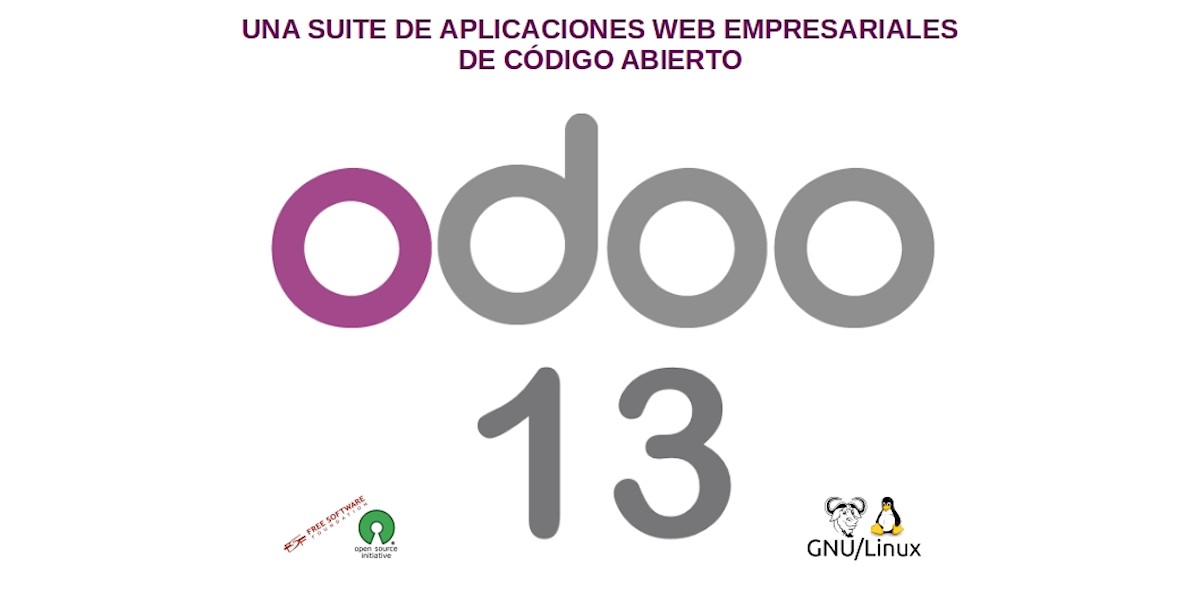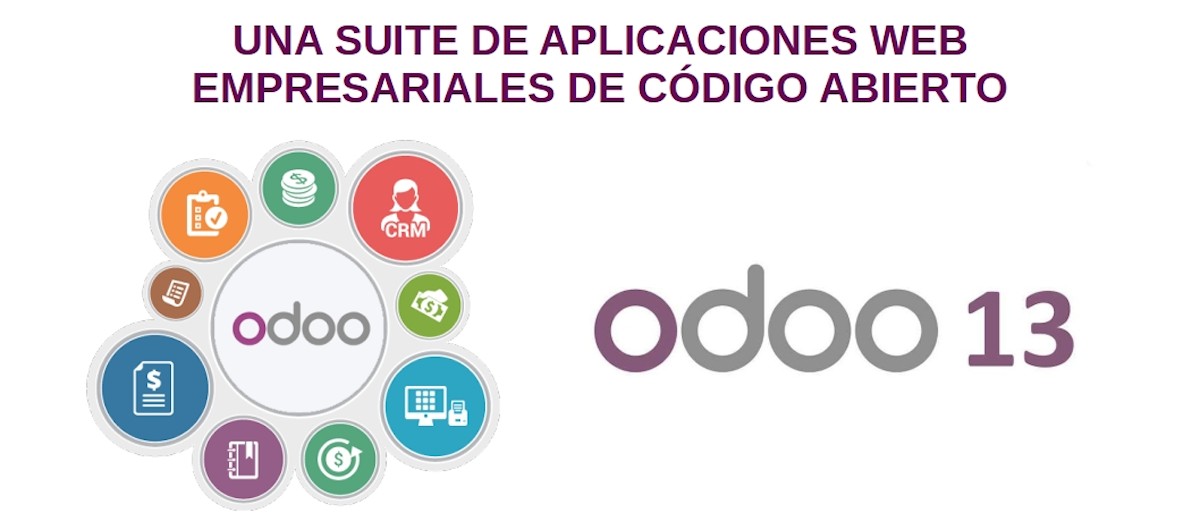
Odoo: An Open Source Enterprise Web Application Suite
In the field of Free Software and Open Source, we often find a wide range of integrated software solutions, to carry out not one but many activities. But, in general, these are focused on the use of technology professionals (Sysadmin, DevOps, Developers, among others) and non-administrative, operational and / or managerial. However, Odoo it's one of those great integrated solutions available.
Odoo is a suite of open source business web applications, well known and used by public and private organizations worldwide, to manage some of their business activities.

Although, Odoo is an extraordinary Open Source application, we did not comment much on it, being one of those few times, the publication called: ODOO: The OpenSource ERP that is giving something to talk about!, from a little over 4 years ago, when Odoo I was going for the version 8.0, and where we describe it as:
"Odoo is an open source enterprise resource planning system previously known as OpenERP (Enterprise Resource Planning), the name change is due to the fact that since its version 8.0 Odoo evolves and goes beyond being a system ERP since very interesting and useful functionalities were added that work as applications or blogs, that is, without the need to be managed by an ERP (however, it continues to allow its users to continue doing it that way)".

Odoo: Enterprise Web Application Suite
General information about Odoo
- It is an ERP Software, that is, it is a managerial resource planner for any type of organization. Reason why, with it, you can manage production, logistics, distribution, sales, inventory, shipments, marketing, human resources, invoices and even the accounting of an organization, among many other activities. . Because of this, Odoo is seen as a complete Management System.
- Odoo has a modular development and has many core applications in an integrated way that cover most of the needs of organizations. In addition, it has thousands of applications in its online store.
- You avoid the need to require interfaces between different software, as your modular applications seamlessly integrate with each other, allowing you to fully automate essential or vital processes within any organization.
Current version features: Odoo 13
Among the notable characteristics, which are mostly focused on the need to adapt the application to the international environment and to raise more money through new forms of monetization of the application itself, the following characteristics can be mentioned:
- Migration to open source of the applications or modules of educational management, eLearning and certification.
- Creation of a new application or module, for payment, called Field Service Management (FSM), to organize, assign personnel, manage, and support the field workforce.
- Updating of the Payroll Management application for a better management of activities, such as, the administration of salary or payments, that is, to comply with labor obligations such as: payroll, Social Security and tax obligations. The module is Open Source, but in its Enterprise version it comes with additions that improve its functionality, in any country, since it brings improvements in terms of location.
- An Internet of Things (IoT) application was added for inventory control, in order to more efficiently manage an organization's stock.
- An OCR application was incorporated to facilitate the scanning of records (invoices, for example) and retrieving your data automatically.
Finally, among many more, it incorporates a Maintenance application that allows monitoring of machines with connected devices, a fleet traceability application that allows tracking the fleet of vehicles, a banking application so that users can request money loans through the app, and a new service for integrating Odoo with human talent recruitment websites.
And to know the news that it will possibly incorporate, the new Community version of Odoo 14.0, which is expected to be launched in October 2020, you can access the following link.
Observations on Odoo
As we can appreciate, Odoo comes with a paid version (Enterprise), but it offers the possibility of downloading the complete system from the Odoo official website, with the advantage of access to source code, which allows to develop new modules to expand functionalities or develop new ones. Which means that it will keep the most important part of it, under the LGPL (GNU Lesser General Public License), I mean, like Open Source.
What guarantees the freedom of users to share and modify himself, in his community version (Odoo Community version), in order to ensure that the Software remain free and open, for any user or organization.
Lastly, Odoo ha been progressively incorporating new applications, to achieve a higher level of efficiency and coverage on the management of any organization. In such a way, that it remains a modern comprehensive solution, increasingly fast, intuitive and easy to use. And to learn more about it, you can access the following links: Odoo Community, GitHub, OpenERP Spain y Wikipedia.

Conclusion
We hope this "useful little post" about «Odoo», which is an extraordinary enterprise web application suite de «Código Abierto» very useful for manage diverse and important business activities within any organization, is of great interest and utility, for the entire «Comunidad de Software Libre y Código Abierto» and of great contribution to the diffusion of the wonderful, gigantic and growing ecosystem of applications of «GNU/Linux».
And for more information, always do not hesitate to visit any Online library as OpenLibra y jedit to read books (PDFs) on this topic or others knowledge areas. For now, if you liked this «publicación», don't stop sharing it with others, in your Favorite websites, channels, groups, or communities of social networks, preferably free and open as Mastodon, or secure and private like Telegram.
Or simply visit our home page at DesdeLinux or join the official Channel Telegram from DesdeLinux to read and vote for this or other interesting publications on «Software Libre», «Código Abierto», «GNU/Linux» and other topics related to «Informática y la Computación», and the «Actualidad tecnológica».
We have it running in the company for six years, shot from memory, and the truth is that we are very happy with the program. Between the free version and the paid version there is very little difference, the support above all, but for a company it is a value to take into account. It does not mean that the free version is not supported, on the contrary, you can contract the maintenance with any partner, we have this option. What most surprised us is the power and adaptability of the solution, a shame that large companies do not take it into account, the program has the power to delight the most demanding accountant. As for the cost of the implementation, installing it and starting it up yourself is only suitable for more seasoned people than me, it is a part of any commercial solution, here you pay for the maintenance (if you don't do it yourself) and if you want any modification / customization that has to be programmed, normally contracted to a partner.
I add to my previous comment: With this isolation of COVID, a facet that is not taken into account comes to light, Odoo is installed as a WEB server, we in question have it on a rented server. This means that I can access from anywhere to telework, be it from home, from the phone, from where I have internet access, all without the need for any addition. It can be installed on its own server, it would undoubtedly be the option for a medium or large company, but for children, as is my case, it is more practical to rent a WEB server, it costs four dogs a year and without having to buy or maintain no local team.
Greetings, Gregorio! Your comment is very successful.